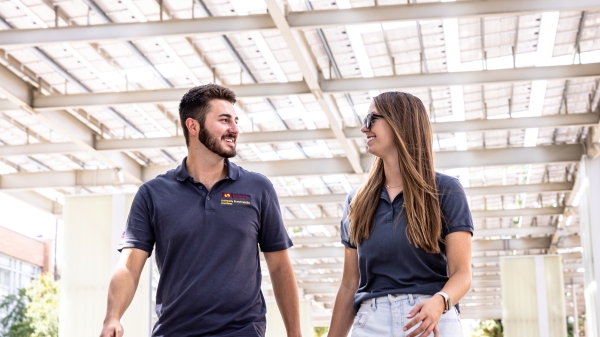Walton sustainability program empowers K–12 educators to combat food waste

Food Waste Futures teacher fellows and program coordinators gathered at SkySong on Sept. 21 to discuss lesson ideas for the Mill Food Recycling Educators Guide. From left: Amy Flores (program manager of Sustainability Teachers Academies), Morgan Kane, Marin Velarde, Shaleta Chatman, Brianne Loya, Andrea Negrete, Jordan Petrine, Matthew King, Madeline Agpoon and Barbara Halden (Mill’s facilitator). Photo courtesy of ASU's Sustainability Teachers Academies
Food waste is one of the most pressing issues of our time, affecting the environment and economies worldwide.
According to the U.S. Environmental Protection Agency, the significant greenhouse gas emissions caused by food waste exacerbates climate change. And according to the U.N.'s Food Waste Index Report, each year, around a third of the world’s food is wasted, causing economic losses of around $1 trillion.
Those at Arizona State University know that addressing this urgent issue requires innovative solutions that start at the community level. The Walton Sustainability Teachers Academies within the College of Global Futures aims to address food waste at its roots –— through education.
This year, the program has partnered with Incite, World Wildlife Fund (WWF) and Mill to launch the Food Waste Futures Fellowship Program with an inaugural cohort of 10 K–12 educators from five schools across the Phoenix metropolitan area.
“An important theme central to the program is empowerment,” said Amy Flores, Sustainability Teachers Academies' program manager, who oversees the fellowship.
The yearlong fellowship program, which started in July, includes training sessions, site visits to schools, lesson plans, proposals and experiential learning activities with partnering organizations that incorporate food systems sustainability and food waste reduction.
“We hope to equip educators with the tools and knowledge they need to inspire the next generation to be stewards of their environment, to develop a deeper awareness of the food supply chain system and how their food choices play a long-term role in our future climate,” Flores said.
Educators and students will collaborate throughout the program to create a Mill Food Recycling Educators Guide, an extension of the WWF Food Waste Warriors educational toolkit, with WWF and Mill Food Recyclers.
“Reducing waste and emissions at home and in our schools can be simple, fun and easy — and we’re proud that Mill’s technology will empower teachers and students to learn and connect in new ways to reduce food waste, use the resources we have to grow more food and inspire sustainable behaviors at home and school,” said Harry Tannenbaum, Mill’s co-founder and president.
“Partners like ASU and Mill will help us take WWF’s Food Waste Warriors program to the next level,” said Alex Nichols-Vinueza, director of the U.S. Food Waste Warriors team.
“The new resources we’re developing will support teachers in Phoenix and help turn their school cafeterias into classrooms to engage students on the food system, its impacts and the critical role food-waste reduction can play in shaping a more sustainable future."
Through its hands-on approach and interdisciplinary focus, the fellowship supports teachers with tools and technology to inspire, educate and encourage students to establish food-recycling activities.
“My students’ passion and interest in the world inspires me to help them be informed and active participants in addressing the environmental challenges,” said Brianne Loya, a participating fellow and also a teacher at Bioscience High School.
“Their futures drive me to emphasize the potential for positive change by giving them opportunities to see that their actions can make a difference."
The fellowship program connects classroom learning with real-life application.
Related: 'ASU Sustainability students tackle hotel food waste'
Through capstone program, seniors from the School of Sustainability collaborate with community partners to address hotel food waste.
Students will conduct food waste audits, participate in farm tours and learn firsthand how food recycling and sustainable farming practices work. This fosters a deep connection between students and their food sources, encouraging them to adopt more sustainable practices at home, in schools and in communities.
“I work with the youngest learners, and if we can instill these behaviors and mindset, hopefully this is something they take with them to their families and the future,” said Marin Velarde, a participating fellow who teaches at Echo Canyon School.
The fellowship aims to create a lasting impact on food-waste awareness and solutions.
“We hope that (through this fellowship), educators and students will change their relationship with food, and will see food waste as a resource,” Flores said. “Food waste is solvable; there’s a lot of value in waste, and every educator and student can each play a vital role in creating a more sustainable food system."
This fellowship adds to the work that the Walton Sustainability Teachers Academies has done since its inception in 2015, cultivating a community of sustainability change-makers and providing developmental opportunities to more than 3,000 teachers across the U.S.
More Environment and sustainability

Charles Redman, founder of the School of Sustainability, faces a new adventure: Retirement
At the retirement celebration for Charles Redman on Oct. 22, two messages persisted: Redman’s contributions to Arizona State University helped to shape the interdisciplinary efforts we now find…

10 climate insights to guide our future
A group of globally renowned social, natural and climate scientists has once again convened to offer their newest annual synthesis report, “10 New Insights in Climate Science.”The report, published…

The future is green: Job demand translates to high employability for ASU sustainability grads
A 2023 report by Forbes on the state of green jobs confirmed what Arizona State University has been trumpeting for years: Sustainability will play a large part in the new economy.The report suggests…